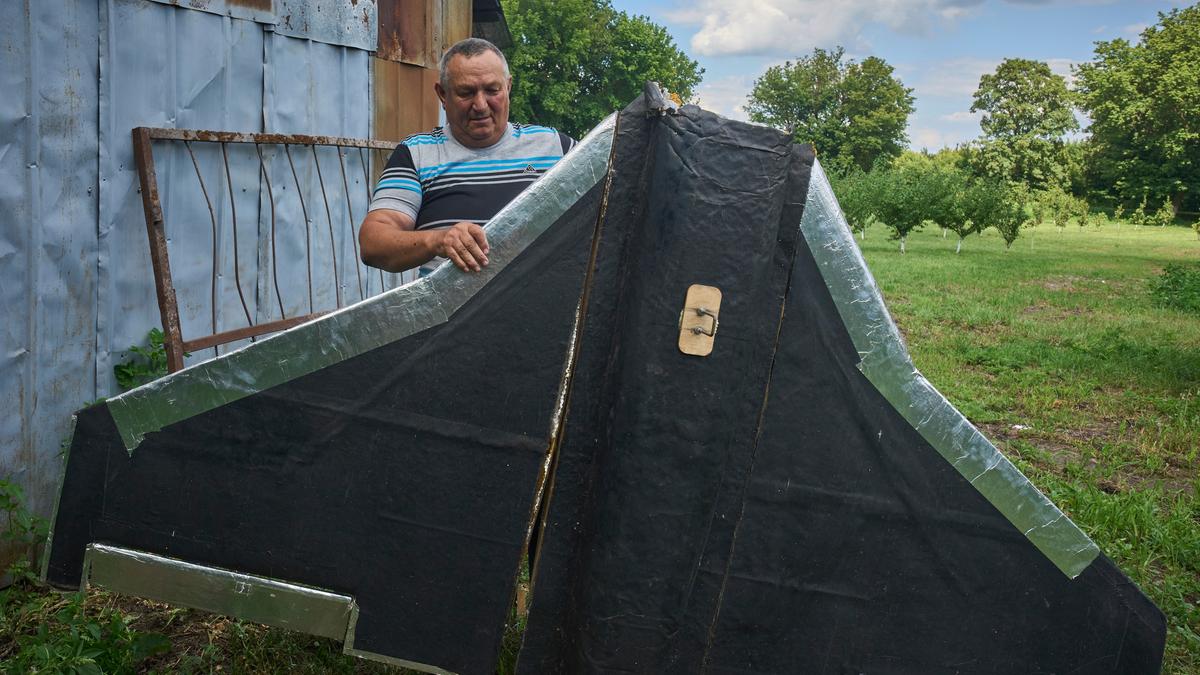Indian parts found in Russian drones, says Ukraine; MEA defends legal exports

New Delhi: Ukraine has formally raised concerns with both the Indian government and the European Union (EU) regarding the discovery of Indian-made or assembled electronic components in Iranian-designed drones deployed by Russian forces in the ongoing conflict.
According to reports, Ukrainian officials have contacted India’s Ministry of External Affairs (MEA) at least twice via diplomatic channels since 2024. The issue centres on components found in Shahed-136 unmanned combat aerial vehicles (UCAVs), which are widely used by Russia.
Raised during EU envoy’s India visit
Ukrainian diplomats also highlighted the matter during a July visit by EU sanctions envoy David O’Sullivan to New Delhi. The discussions included the EU’s latest sanctions package, which bans imports of refined oil products made from Russian crude, and concerns over the involvement of India’s Vadinar refinery—partly owned by Russia’s Rosneft.
Indian-origin components found in drones
A Hindustan Times report stated that an investigation by Ukrainian defence authorities identified components made or assembled in India from two firms—Vishay Intertechnology and Aura Semiconductor.
A “bridge rectifier E300359” produced by Vishay Intertechnology and assembled in India was reportedly found in a voltage regulator inside the drone. Additionally, a PLL-based signal generator chip (AU5426A) manufactured by Bengaluru-based Aura Semiconductor was allegedly used in the drone’s satellite navigation system.
No violation of Indian laws, say officials
According to HT, sources familiar with the matter have clarified that neither company has breached Indian law. The components identified are classified as dual-use items, which means they are permitted for civilian or military use and are not restricted under Indian export controls.
MEA: Exports governed by law
In response, MEA spokesperson Randhir Jaiswal stated, “India’s export of dual-use goods is governed by a strong domestic legal framework and adheres to international obligations. Due diligence is conducted to ensure such exports do not violate any of our laws.”
Following Ukraine’s concerns, Indian security officials visited electronics manufacturers in Delhi, Bengaluru, and Mumbai to raise awareness about export restrictions and the risks of diversion through unauthorised channels.
Companies respond, traceability issues flagged
Aura Semiconductor co-founder Kishore Ganti acknowledged the company’s awareness of its component’s potential use in the conflict. He noted that the firm had conducted a limited audit, but the findings were inconclusive due to the nature of the “plug-and-play” product, which requires no manufacturer support, making end-use traceability challenging.
In a formal statement, Aura Semiconductor said it was “deeply disturbed” by the possibility that its products may have reached defence manufacturers via unauthorised third-party channels, and added that it is committed to investigating any potential violations of its compliance policies.
Vishay Intertechnology has not publicly commented on the matter.
Third-country diversion suspected
Officials indicated that the components were legally exported to countries in West Asia and may have been diverted from there to Iran or Russia. India, like many open economies, faces the challenge of monitoring the end-use of dual-use technologies once they are exported to third parties.
Shahed drones and wider implications
The Shahed drone, designed by Iran and known for its cost-effectiveness, has been widely deployed by Russian forces since late 2022 to target Ukrainian infrastructure. Ukraine’s Security Service (SBU) reported that Iran initially supplied 2,000 fully assembled drones to Russia, which later began domestic assembly using Iranian parts. In July 2025 alone, Ukraine’s air force claimed over 6,000 Shahed-type drones were launched by Russia.
Ukraine’s defence intelligence agency has also revealed the presence of US and Chinese-made components in Russian drones and weapon systems, underscoring the global complexities of military supply chains.
Ajay Srivastava, founder of the Global Trade Research Initiative (GTRI), remarked that while India does not permit direct exports of dual-use goods to sanctioned countries, it is extremely difficult to trace their use once such items are legally exported to legitimate third-country buyers.
Subscribe to our Newsletter
Disclaimer: Kindly avoid objectionable, derogatory, unlawful and lewd comments, while responding to reports. Such comments are punishable under cyber laws. Please keep away from personal attacks. The opinions expressed here are the personal opinions of readers and not that of Mathrubhumi.

